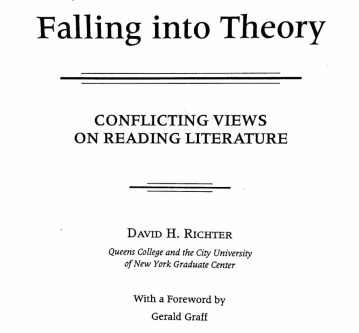
Cover page: Richter, David A. Falling Into Theory: Conflicting Views on Reading Literature. New York: Bedford St. Martins, 2000.
“The literary texts most widely read today are those read in schools, and teachers are likely to teach texts that were valued when they were students.” (125)
This concept matters greatly to me because I am an aspiring educator. I believe it is an issue that teachers are continuing to teach the literature they were taught in school. This is a problem because I have learned the importance of students relating to the stories they are reading. While some students may relate to the texts teachers may be using from their days of schooling, they will not relate to all or the majority of students. That is why it is important for teachers to find texts that matter to their particular students at the time. If teachers use the same list of books to all of their classes, they are using a “one-size fits all” approach that will not be effective in capturing and maintaining their students attention. The following quotes and responses are from David Richter’s “Falling into Theory.”
- “As society changes, such works take one of two trajectories: downward to oblivion or upward toward canonical status. Most do the former” (p.125).
- After reading this quote, I wonder how it is possible for more of the works to be moving off of the canon, yet the list has stayed the same for decades.
- “Strong conservative forces-including the very idea of the canon- operate to keep the canon constant. Institutional education may be the strongest of these…Furthermore, some texts may survive precisely because they are useful to educators” (p.125).
- This quote explains that these works have stayed in the canon because educators, the people who are purchasing and using literary works frequently, are the ones keeping the canon constant. I know that education is trying to move toward more multicultural literature, so I wonder how long it will take for the Canon to expand more to be more inclusive.
- “Literary quality is simply a fucntion of the current interests of the reading public; each public revises the short lists drawn up by the publics of the past in accordance with its own cultural needs” (p.126).
- Therefore, I believe that the current public will continue moving toward a more inclusive Canon, as described in this New York Times article.
- “The public debates about the canon and the curriculum were more overtly based on political issues that arise from our cultural preoccupations with race, nationality, gender, and sexual orientation and on the feeling that literary excellence should not be limited to dead white European males” (p. 131).
- This issue of having literature from dead European authors is an issue and more people are advocating for inclusivity. Not only in regard to race, but also the race, nationality, gender, and sexual orientation, as listed above.
After reading this, I am curious as to the specific details of a work being introduced or added to the canon. What is the process it has to go through in order to stay on the list or be added to it. I interpreted the Canon as being a type of informal list that society deems as of high standard. However, is there an actual “official list”, or is the Canon merely the texts being used and read repeatedly throughout education and society? Educators need to critically question the Canon itself, why they are still using in their classrooms, and if the standards they are teaching actually call for these texts specifically to be taught. I challenge you to find more diverse, multicultural, and Non-Western texts to replace these. I predict that you will find texts you actually enjoy and that better fit the needs of your students.
Vocabulary words:
“literary canon”-literary texts that are thought to embody the highest standards of literary culture
“foundationalist”-to make strong unprovable assumptions about the nature of reaoit or society or human psychological processes, that if contested, leave their theories without explanatory power.
“initiators”-the authors of texts
“mediators”editors, publishers, marketers, reviewers, teachers
“Orientals”- Orientalism concept that, Arabs, Indians, and Chinese were seen as a sort of “other” from Western Europeans. “Distinctly ‘others’, not like ‘ourselves’ and could be ruled from outside rather than rule themselves”